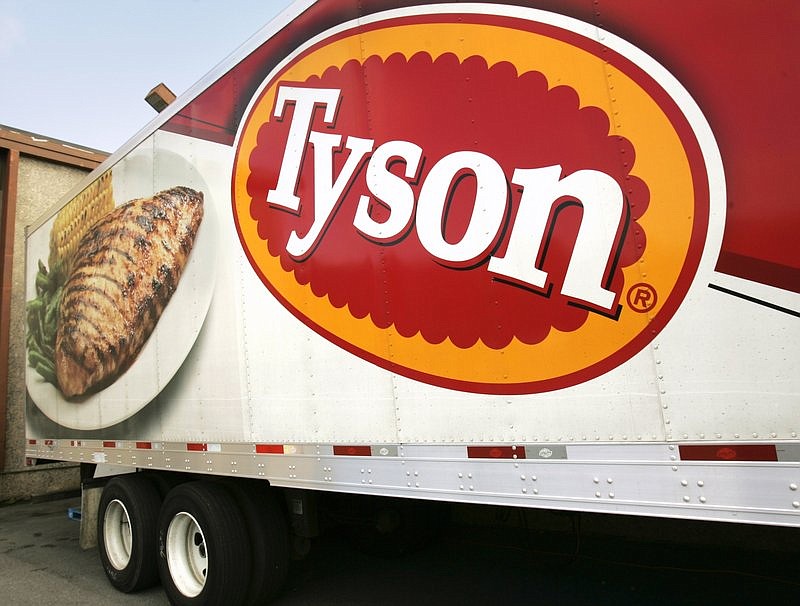Springdale-based Tyson Foods Inc. is investing in one of the world's top insect ingredients companies with plans to bring a production plant to the United States.
Tyson made a direct equity investment in Netherlands-based Protix and has entered a joint venture agreement with the company to operate and construct an insect ingredients facility somewhere in the continental United States, the companies said Tuesday.
A Tyson Foods spokesman declined to provide details on the size of the company's equity investment, its stake in Protix or the potential location of the U.S. plant.
When completed, the plant will be one of the first large-scale operation of its type, and produce insect proteins and lipids for use in the pet food, aquaculture and livestock industries, according to the companies. The U.S. operation's production will be three to four times larger than Protix's Netherlands plant.
"Our partnership with Protix represents the latest strategic investment by Tyson Foods in groundbreaking solutions that drive added value to Tyson Foods' business," John R. Tyson, chief financial officer of Tyson Foods said in a statement. "The insect life cycle provides the opportunity for full circularity within our value chain, strengthening our commitment to building a more sustainable food system for the future."
When completed, the U.S. facility will include an enclosed system for insect protein production, including breeding, incubating and hatching of insect larvae. The processed larvae will be used for the aquaculture and pet food industries with other possible uses in livestock and plant feed.
"Tyson Foods' and Protix's strategic partnership advances our joint work towards creating high-quality, more sustainable protein using innovative technology and solutions," Kees Aarts, Chief Executive Officer of Protix, said in a statement. "Moreover, we can immediately use their existing byproducts as feedstock for our insects. This agreement is a major milestone for Protix and significantly accelerates our ambition to grow through international partnerships."
Protix uses food industry waste as feed for the black soldier fly, then the insects are processed into proteins and lipids (fat), according to the company. Its customers use these proteins and lipids as ingredients for feed and food. The company also uses some waste products from the insects as components for organic fertilizer.
"Black soldier fly farming is fully circular," a Protix spokesman said in response to questions. "Everything from the insect can be used, beyond proteins and fats there is also skins and insect droppings, these (leftovers) are a natural fertilizer; we call it Flytilizer."
Protix's facility in the Netherlands has been in operation since 2019 and has global customers in the pet food, aquaculture feed, livestock feed and organic fertilizer industries.
Last year, French insect ingredients company Innovafeed joined with ADM, a U.S.-based food processing and commodities giant, with plans to build what the companies called the world's largest largest insect protein production site in Decatur, Ill. The project broke ground in January, according to local media.
Alan Ellstrand, a professor in management and associate dean of programs and research at the Walton College of Business at the University of Arkansas, said Tyson's investment in Protix shows the company's interest in using innovative approaches in food production.
"Tyson's investment in Protix shows their commitment to finding innovative and sustainable solutions in the protein industry and signals their support for the environment to investors and industry analysts," he said in response to emailed questions.
The Springdale-based company has been struggling with profitability in recent months, reporting back-to-back quarterly losses, as it faces pressure in all of its meat segments but primarily chicken. It has closed or is in the process of closing, six plants this year, including one in Van Buren and one in North Little Rock.
In August, Tyson reported a loss of $417 million, or $1.18 per share, for its third quarter compared with a profit of $750 million, or $2.07 per share, in last year's third quarter. Tyson said its revenue fell 3% from last year's third quarter, to $13.14 billion. The sales decline was mainly in the pork and chicken segments, Tyson said.
The company reported a loss of $97 million, or 28 cents per share, in its second quarter compared with a year-ago profit of $829 million, or $2.28 a share.
During recent conference calls, company executives highlighted Tyson's moves to modernize and become more efficient across all its operating segments. Tyson President and CEO Donnie King indicated the company would continue to push to improve its performance.
The company is expected to report its fourth quarter results on Nov. 13.
Tyson shares closed at $47.20, down 17 cents or less than 1% in trading Tuesday on the New York Stock Exchange. Shares have traded as low as $46.16 and as high as $69.07 over the past year.
